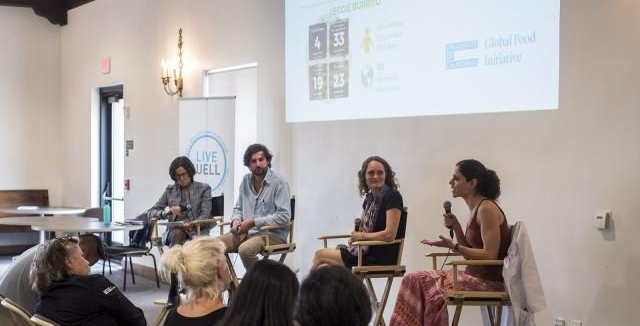Chocolate Crickets: A Beginning to Food Week
News articles across the internet and random links on Facebook are constantly expressing how harmful it is to eat meat because of how the meat is made and processed. However, few of these sources provide alternative, delicious options. Take for example this news article by PBS, which cites scientific studies showing the correlation between consumption of processed meats and colorectal cancer. It’s difficult to truly listen to what articles like these are trying to get across when most meats are so widely accepted in society and used in many foods today.
Attending the Food Day Panel Discussion a few weeks ago, organized by UCLA’s Healthy Campus Initiative was extremely eye opening. National Food Day is recognized annually on October 24 and was established by the Center for Science in the Public Interest to celebrate healthy, affordable, and sustainably produced food (National Food Day). This panel celebrated Food Day with a discussion featuring experts in nutrition, environmental sustainability, and food science. Specifically the panel featured Dr. Dana Hunnes (Senior Dietician at UCLA Medical Center), Elliot Mermel (CEO and Cofounder of Coalo Valley Farms), Dr. Jennifer Jay (Professor at UCLA Institute of Environment and Sustainability), and moderated by our own Dr. Wendy Slusser, Associate Vice Provost of UCLA Healthy Campus Initiative.
Daily Bruin, Week of October 24.
When I first walked into the event at 12pm Monday of October 24, I immediately encountered a table full of vegan dishes. Food from apple vegan chicken to beet salad to kale and quinoa salad and finally some delicious cucumber water filled the tables. This was what they called a “Flexitarian Lunch.” A flexitarian diet is one that is primarily plant-based with the occasional inclusion of meat products. This type of lunch gave attendees like me the opportunity to experience what a common lunch is for those who follow a flexitarian diet.
The Food Day Panel first started off talking about the damage to the environment that is caused by meat-based farms. They emphasized the increase in greenhouse gases is mainly caused by cows and pigs. Some European studies have even identified an increase in greenhouse gases upwards of 18% to 31% of the total EU emissions as a result of livestock farming (European Commission, 2006). The panel discussed alternatives to eating meats, which included many different types of plants as substitutes. One strong point that they made was that an individual could receive the necessary amount of daily protein from eating a reasonably-sized portion of vegetables instead of meat. A common approximation is a 3 oz portion of chicken equaling 1 cup and 2.5 tablespoons of lentils or 1-1.3 cups of black beans. This was very informative because I feel that many people do not realize the amount of nutrients you can get from simply eating plant-based foods.
After a general discussion about the effects of eating meat, Mermel began talking about his unique cricket farm. Attendees were offered samples of his chocolate crickets, and I found them quite delighting. I initially found the crunchiness of the cricket exoskeleton a little unsettling. However, after swallowing it and letting my taste buds really marinate the chocolate taste, I could not taste the cricket at all. It was sweet and creamy as any chocolate would be. I’m thankful I tried them, but would you have tried them? The crickets eat an all-organic diet of fruits and vegetables that are grown on the farm as well. Thanks to people like Mermel, eating insects is becoming more and more popular and socially acceptable now!
Not only are the crickets nutritious, but they are raised in an environmentally friendly way as well. Mermel talked about how the farm utilizes an aquaponics system. This aquaponics system combines conventional aquaculture (raising fish) with hydroculture (growing plants in water instead of soil). The farming requires little resources and the resources that are used (water) is continually recycled. In addition to the discussion of the cricket farm, Dr. Hunnes briefly talked about the effects of processed meat on our bodies and lifestyle while Dr. Jay discussed the impact of agriculture on the environment.
Reflecting on the panel’s discussion, I’ve come to realize that educating and convincing people seems to be the biggest struggle. Even my friends are not as open to making changes in their current diet because they are comfortable with their current lifestyle. Stepping out of that comfort zone takes not only a risky jump but also an open mind. Consequently, Tthe panel stressed the importance of sharing information and continuing to educate friends and acquaintances about different alternative options to meat.
Attending this discussion made me more aware of alternative diets and I look forward to potentially incorporating some of these ideas I learned about into creating delicious and environmentally friendly meals! I’ve even already looked into some new flexitarian recipes. It’s events like these that truly make me think about what I’m eating and I’m glad I had the opportunity to learn about something important to me outside of my immediate educational curriculum. I look forward to attending more events like these that make me mindful of what I’m eating.
Phillip Cox is a 4th year Bioengineering major and blogger for the Eat Well Pod within the Healthy Campus Initiative.


